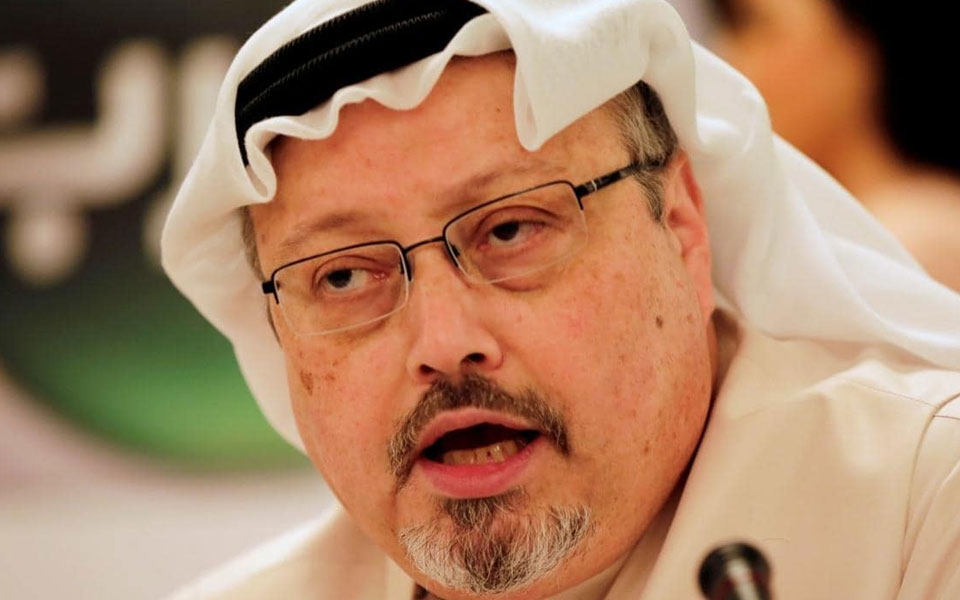Istanbul, Nov 5 : Saudi Arabia deployed a chemist and toxicology expert to Istanbul after the murder of journalist Jamal Khashoggi in an attempt to cover up evidence of the killing, a Turkish newspaper reported on Monday.
The murder of the Saudi royal-insider-turned critic inside Saudi Arabia's consulate in Istanbul has provoked widespread international outrage.
Turkish authorities have released gruesome details of a killing that President Recep Tayyip Erdogan has said was a targeted hit.
While Riyadh officials have admitted the murder was planned, they have so far declined to release details of the whereabouts of the 59-year-old journalist's missing body.
According to Turkey's pro-government Sabah daily, Saudi Arabia sent an 11-member "cover-up team" to Istanbul on October 11, nine days after the Washington Post contributor vanished after entering the diplomatic compound to obtain paperwork for his marriage.
The paper said chemist Ahmad Abdulaziz Aljanobi and toxicology expert Khaled Yahya Al Zahrani were among "the so-called investigative team", which visited the consulate every day until October 17, before leaving Turkey on October 20.
Saudi Arabia finally allowed Turkish police to search the consulate for the first time on October 15.
Turkey's chief prosecutor said last week that Khashoggi was strangled as soon as he entered the consulate and also confirmed the body was dismembered.
Yasin Aktay, an advisor to Erdogan, hinted in an article published on Friday that the body may even have been destroyed in acid.
In an editorial published in The Washington Post, Erdogan accused authorities in Riyadh of refusing to answer key questions about the murder, despite their arrest of 18 suspects a fortnight ago.
He said the order to murder the journalist came from "the highest levels" of the Saudi government, adding that he did "not believe for a second" that King Salman was to blame.
But he pointedly failed to absolve Crown Prince Mohammed bin Salman of responsibility for unleashing a "death squad" against the outspoken Saudi journalist.
The murder has badly tainted the kingdom's de facto ruler.
Saudi Attorney General Sheikh Saud al-Mojeb met with Turkish authorities last week in Istanbul but refused to share information from Riyadh's own investigation, according to Turkish officials.
Let the Truth be known. If you read VB and like VB, please be a VB Supporter and Help us deliver the Truth to one and all.
Hyderabad (PTI): Telangana Chief Minister A Revanth Reddy met Union Home Minister Amit Shah in Delhi on Wednesday night and urged him to increase the sanctioned strength of IPS officers to the state in view of its growing administrative and security needs.
The two leaders also discussed the recent surrender of several senior Maoist leaders before the Telangana Police and other issues.
"During the meeting, the two leaders discussed the issue of Maoist surrenders and their rehabilitation. The chief minister informed Shah that significant improvements in policing have taken place in Telangana over the past two years," an official release here said.
Highlighting that 591 Maoists have laid down their arms and joined the mainstream of society during this period, the chief minister said the state government was providing them compensation and rehabilitation assistance as per the rules.
He requested the Union home minister to extend financial support from the central government for development works in the backward regions of the state.
Reddy also urged Shah to increase the sanctioned strength of IPS officers to the state from 83 to 105 in line with the state's growing administrative and security needs, the statement said.
The first cadre review after the formation of Telangana was conducted in 2016, while the next review, due in 2021, was delayed and finally carried out in 2025. Even then, only seven additional IPS officers were allocated to the state, the chief minister informed Shah and requested that the third cadre review be conducted in 2026 as per the schedule.
Reddy explained that Telangana, like the rest of the country, is facing several modern challenges, including cybercrime, drug trafficking, white-collar crimes, and other emerging security threats.
He highlighted the reorganisation of the Hyderabad, Cyberabad, and Malkajgiri Police Commissionerates, the proposed formation of the Future City Commissionerate and the rapidly growing population in Hyderabad to underline the increasing administrative requirements of the state.





